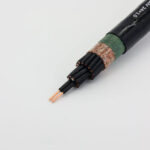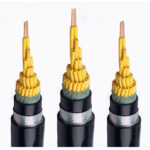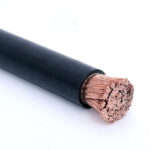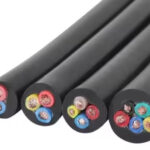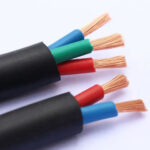In the world of electrical wiring, 12 gauge (AWG) stranded wire holds a sweet spot, balancing robust current capacity with the crucial flexibility needed for many applications. It's thinner than 10 AWG but thicker than 14 AWG, making it a go-to choice for a variety of 20-amp circuits and more. This guide will delve into the specific properties, typical ampacity, widespread applications, and essential installation considerations for 12 AWG stranded wire. For a broader understanding of the benefits of stranded over solid wire, refer to our Stranded vs. Solid Wire: Your Ultimate Guide to Choosing the Perfect Electrical Conductor.
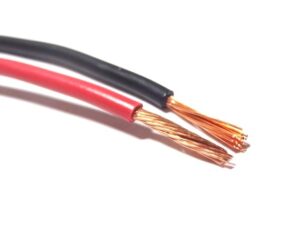
12 gauge stranded wire
Understanding 12 Gauge Stranded Wire
12 AWG is a widely used conductor in both residential and commercial settings. Its stranded construction, meaning it's composed of multiple fine copper strands twisted together, significantly enhances its utility compared to a solid counterpart of the same gauge.
Why Stranded for This Gauge? Even at 12 AWG, a solid wire can be quite stiff, making it challenging to pull through conduits, especially in longer runs or around multiple bends. The stranded nature of 12 gauge wire provides:
- Enhanced Flexibility: Much easier to bend and route without kinking or stressing the conductor.
- Vibration Resistance: Less likely to break in environments subject to movement or vibration, common in appliances, vehicles, or industrial machinery.
- Ease of Installation: Reduces labor when pulling wire through complex pathways.
Common Materials & Insulation: Like most common wires, 12 gauge stranded is primarily made of annealed bare copper. Insulations are typically chosen based on the environment and temperature ratings:
- THHN/THWN: Frequently used as individual conductors in conduits for residential and commercial wiring, offering heat, moisture, and oil resistance.
- PVC: Common for appliance cords and general-purpose flexible cables.
- Automotive Wire (e.g., GXL, TXL): Designed for vehicle applications, with thin, tough insulation for space efficiency and high-temperature resistance.
12 Gauge Stranded Wire Ampacity (Current Carrying Capacity)
The ampacity of 12 AWG stranded wire is a critical factor for safety and performance. Generally, its ratings are:
- 20 Amps at 60°C (140°F) insulation rating
- 25 Amps at 75°C (167°F) insulation rating
- 30 Amps at 90°C (194°F) insulation rating
Crucial Caveats: Remember, these are guidelines. Actual safe ampacity depends heavily on:
- Insulation material and its temperature rating.
- Ambient temperature: Higher temperatures require derating.
- Installation method: Wires in free air can carry more current than wires bundled in conduit.
- Number of conductors: Bundling multiple current-carrying conductors in a single conduit requires derating.
- Local electrical codes: Always consult the National Electrical Code (NEC) or your local jurisdiction's regulations.
For a deeper dive into ampacity calculations and factors, explore our Understanding Wire Gauge (AWG) and Ampacity: A Complete Guide.
Key Applications of 12 Gauge Stranded Wire
12 AWG stranded wire's blend of current capacity and flexibility makes it incredibly versatile:
- 20-Amp Household Circuits: The standard for general-purpose circuits in kitchens, bathrooms, laundry rooms, and garages, where higher current draw appliances (e.g., toasters, hair dryers) might be used.
- Dedicated Appliance Circuits: For individual appliances like microwaves, dishwashers, garbage disposals, or smaller window air conditioning units that require a 20-amp circuit.
- Many Lighting Circuits: While 14 AWG is common, 12 AWG is often used for lighting circuits, especially in commercial settings or longer runs, to minimize voltage drop.
- Extension Cords & Power Tools: Its flexibility and durability make it ideal for heavy-duty extension cords and internal wiring of power tools.
- Automotive Wiring: For various circuits in vehicles, including headlights, accessory power, and medium-current runs, where vibration and flexibility are constants.
- Smaller Solar Systems: Used for connecting panels to charge controllers or inverters in mid-size residential solar installations.
- Speaker Wire: For higher-power audio systems or longer speaker wire runs where resistance needs to be minimized.
Installation Considerations for 12 Gauge Stranded Wire
Proper installation ensures reliability and safety:
- Ease of Routing: Its flexibility makes pulling 12 AWG stranded wire through conduit, tight spaces, and around corners significantly easier than solid wire, reducing installation time and effort.
- Termination Best Practices: To prevent fraying and ensure a secure connection, especially at screw terminals:
- Ferrules: Highly recommended for screw-down terminals. These metal sleeves are crimped onto the end of the stranded wire, consolidating the strands into a solid, reliable contact point.
- Crimping: Use crimp connectors (e.g., spades, rings) sized for 12 AWG, along with a proper crimping tool, for robust mechanical and electrical connections.
- Careful Stripping: Use a wire stripper appropriate for 12 AWG to ensure only the insulation is removed without nicking or cutting any strands.
Our Essential Wire Termination Techniques for Every Project provides more detailed guidance on proper termination.
Where to Buy 12 Gauge Stranded Wire
12 gauge stranded wire is readily available at all major hardware stores, electrical supply distributors, and numerous online retailers. When purchasing, confirm the insulation type, conductor material, and any specific certifications (e.g., UL listed) required for your application.
Safety Reminders
Always prioritize safety when working with electrical systems:
- Verify that the wire gauge is appropriate for the circuit's overcurrent protection (breaker/fuse) and the expected load.
- Strictly follow the National Electrical Code (NEC) or your local electrical regulations.
- Ensure the wire's insulation is suitable for its operating environment (e.g., exposure to moisture, heat, chemicals).
- If you're unsure about any aspect of your electrical project, always consult a qualified, licensed electrician.
Conclusion
12 gauge stranded wire is a workhorse in countless electrical applications, prized for its excellent balance of current capacity and critical flexibility. Understanding its specific ampacity, common uses, and proper installation techniques empowers you to create safe, durable, and high-performing electrical systems for both residential and light commercial projects.

